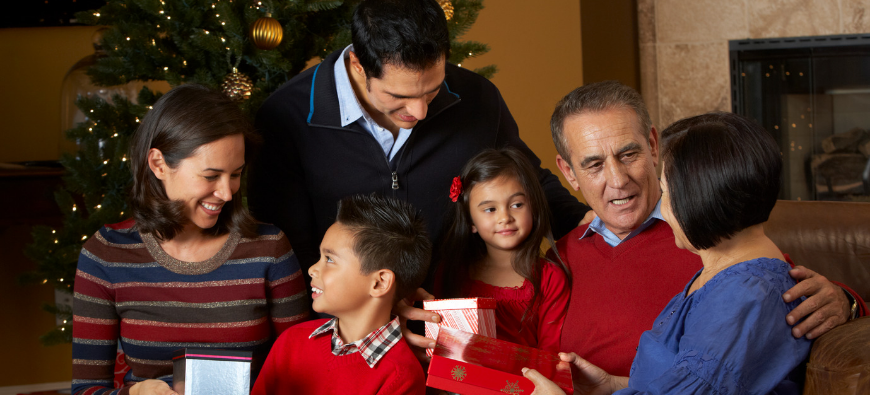
Supporting loved ones with dementia over the holidays
By Dr. Joanna Sue, Neuropsychologist, St. Peter’s Hospital
If you have a loved one with dementia, you may have noticed their ability to participate in celebrations or large gatherings has changed. While the holiday season is a wonderful time of year to spend with family and friends, some common holiday activities can be overwhelming for people with dementia.
Every person with dementia is different, but some common symptoms include:
• memory loss
• difficulty with communication and problem-solving
• reduced ability to plan, organize, and complete multi-step tasks
Modifications can make holiday preparations and gatherings easier and more enjoyable for people with dementia, and their families. To prioritize, and set manageable expectations, ask yourself: what do the holidays mean to our family? Thinking about the true purpose of the holidays may help you decide which aspects of the holidays are worth spending your time and energy on. You may want to consider shortening gatherings, having a potluck or catered meal, having lunch instead of dinner, having an earlier dinner, or hosting a few smaller celebrations rather than one big gathering.
As you prepare for the holidays, also consider these tips.
Advanced preparation
● If possible, talk to your loved one about preparing for upcoming holiday events. Describe each part of the event and discuss ways you and others can provide support.
● If your loved one lives in long-term care, tell the staff about your holiday plans and ask for tips about how to make them a success. They may be able to make suggestions based on your loved one’s current routines and preferences.
● Update family members on how your loved one is currently doing. Your loved one may have experienced cognitive and physical changes since the last family gathering, and providing an update helps others know what to expect.
Getting your loved one involved
Dementia affects parts of the brain differently. For example, your loved one may be unable to tell you what they ate for lunch but can describe a childhood memory in vivid detail. Identifying your loved one’s preserved abilities can help you to select activities and conversation topics they can participate in, even if it is in a modified way. Some examples of commonly preserved abilities are: reading, singing, and actions that rely on “muscle memory,” such as rolling dough or washing dishes.
Having your loved one assist with holiday preparations, or take part in traditions can make them feel valued and included. These are simple ways to include them in activities:
● Break down tasks into parts and give them one thing to focus on at a time. For example, when wrapping presents give them one present at a time. When decorating, hand them one ornament or decoration at a time.
● Even though your loved one may not be able to follow a recipe or list of instructions, they can help when given a specific hands-on task such as peeling fruits or vegetables, rolling dough, mixing ingredients, or polishing silverware. Set them up with all the materials they will need. Remember: the task may take longer and may not be done “perfectly,” but the purpose is to provide your loved one with the chance to contribute and be a part of the festivities.
● Play holiday music and sing along together. If reading is a preserved ability, print out the lyrics in large font for everyone, so your loved one can sing along easily.
Social gatherings
For longer events, plan rest and bathroom breaks ahead of time, because with the excitement of the festivities, it is easy to lose track of time. Set an alarm on your phone or pair breaks with scheduled activities, for example taking a bathroom break before every meal.
Identify a quiet area where your loved one can go to rest during the event. In addition to offering scheduled breaks, watch for signs of fatigue and encourage your loved one to take more breaks if needed.
Use labels to increase your loved one’s independence and confidence. Consider name tags with each person’s name written in large font with a thick black marker. This can help your loved one to feel more comfortable and reduce anxiety. You may find that others appreciate this as well! If you are going to someone else’s house for an event, create signs with a word and picture to identify important rooms like the bathroom. This will promote your loved one’s independence in finding their way around.
Conversation tips
Focus on conversations that don’t have a “right” or “wrong” answer. Stay in the present moment—try to avoid asking questions that rely on your loved one recalling a specific memory. Share history—asking about events that happened a long time ago is likely to elicit more memories than asking about recent events.
Here are some good conversation starters:
• What were the holidays like when you were growing up?
• How are you enjoying the food/music?
• What do you think of the decorations?
Remember this important quote: “When you’ve met one person with dementia, you’ve met one person with dementia.” This disease affects everyone differently, so pick and choose the tips that you think will work best for you and your loved one. Remember to build in some time during and after the holidays to unwind and take care of yourself!
